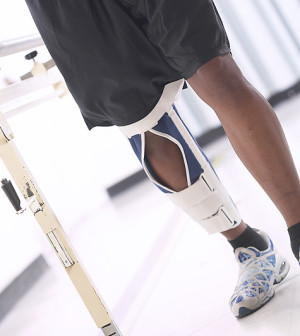- Could Your Grocery Store Meat Be Causing Recurring UTIs?
- Are You Making This Expensive Thermostat Error This Winter?
- Recognizing the Signs of Hypothyroidism
- 10 Strategies to Overcome Insomnia
- Could Artificial Sweeteners Be Aging the Brain Faster?
- Techniques for Soothing Your Nervous System
- Does the Water in Your House Smell Funny? Here’s Why
- Can a Daily Dose of Apple Cider Vinegar Actually Aid Weight Loss?
- 6 Health Beverages That Can Actually Spike Your Blood Sugar
- Treatment Options for Social Anxiety Disorder
Weight Gain or Loss Linked to Fracture Risk in Older Women


The risk of broken bones increases with both weight gain and loss in older women, according to a new study.
These findings challenge the widely held belief that weight gain protects older women against fractures, the researchers said.
The study included data from more than 120,000 healthy postmenopausal women in the United States. The women were between the ages of 50 and 79 years old. Their health status was followed for an average of 11 years.
A weight loss of 5 percent or more was associated with a 65 percent higher risk of hip fracture, according to the researchers. They also found a 9 percent higher risk of upper limb fracture, and a 30 percent higher risk of central body fracture (hip, pelvis and spine) with weight loss.
A weight gain of 5 percent or more was linked to a 10 percent higher risk of upper limb fracture and an 18 percent higher risk of lower limb fracture, the study found.
The study wasn’t designed to prove that weight loss or gain was responsible for the fractures, only that there was an association between these factors.
The investigators also found that unintentional weight loss was associated with a higher risk of hip and spine fractures. On the other hand, intentional weight loss was associated with a higher risk of lower limb fractures, but a lower risk of hip fractures.
The study, by Carolyn Crandall, a professor at the University of California, Los Angeles David Geffen School of Medicine, and colleagues was published Jan. 27 in the journal BMJ.
It’s the first study to examine how weight changes affect older women’s fracture risk in different parts of the body, and offers important information for doctors, the study authors said in a journal news release.
More information
The U.S. National Library of Medicine has more about fractures.
Source: HealthDay
Copyright © 2026 HealthDay. All rights reserved.










